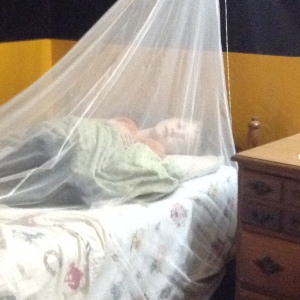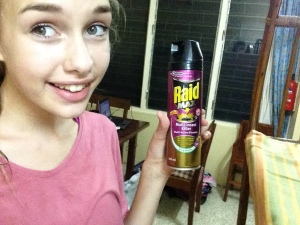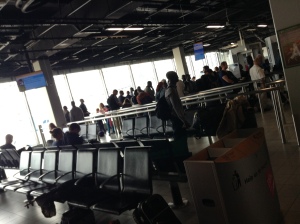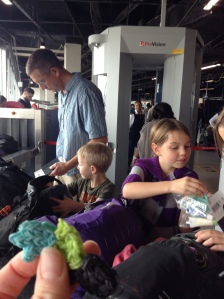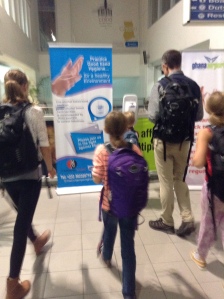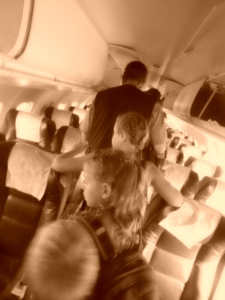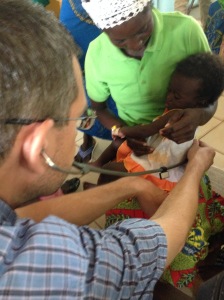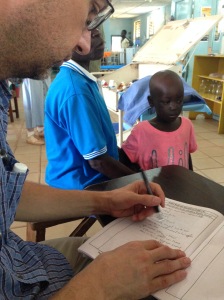“Becoming fearless isn’t the point. That’s impossible. It’s learning how to control your fear. And how to be free from it.”
There’s a purple elephant in the room. One that I promised I would address. The twenty one days are up.
Though there was anticipation in the Canadian customs line…
We were welcomed back to Canada with only a few curious questions and a raise of the eyebrow. “So what were you doing in West Africa? You were volunteering in a hospital?”
There was no forced isolation. It was Ghana, not Liberia, Sierra Leone, or Guinea. We were about the distance between Vancouver and northern Saskatchewan. When there was a SARS outbreak, did we leave Canada? Vacate Saskatchewan because we were ‘near’ Vancouver?
A friend shared that her preschool son was praying we wouldn’t get Ebolum. Cute. Whatever you call it, it’s nasty. I will tell you all now that I wasn’t the face of courage.
I know you all were worried, or ‘wondering’ at our choice. It was the looks on the faces, the questions, or the ‘discussions’ in the OR and hospital wards. If you don’t know me, then I’ll tell you, I’m not the picture of fearlessness. I might appear confident, but it’s learned–because like more than enough people, I’ve fought a planeful of fears. The words, West Africa, caused a few mini-meltdowns for me, no matter how close or distant it was.
I’ve been watching this epidemic unfold since last winter, before most people knew it existed. It was all over the news. I knew I was going to WEST AFRICA. I didn’t think bringing my family of six into Ebola territory was such a clever idea, even if we were relieving pressure of some seriously busy third world medical staff. Even if we made a commitment over a year and a half ago. Even if our lives were meant to be spent living, and sharing, and not whiling away in luxury. I’m not an extremist looking for a suicide mission. I hoped, and expected, the Ebola epidemic would decline–not spiral internationally. (And I might have been quoted to say that it wouldn’t land in the US. I politely clear my throat…I was wrong).
I might not have let on that I was ‘concerned’. A small handful knew. It wasn’t just a discussion with my husband. I think I can confidently suggest I’ve had an argument with my husband that most haven’t. I did more than argue it out with him a handful of times. Mini-meltdowns that he had to accept–I didn’t instinctively think that heading closer to the flame was a great idea. Not everyone is as instinctively brave, and rationally-minded, or as confident in gloves, masks and handwashing techniques, or calm, cool and collected under pressure as he is.
We prayed a lot, occasionally for perspective, definitely for courage. Coded prayers with kids, and many prayers without. We didn’t tell them much about Ebola. We told them too much about cholera and malaria, since we were definitely heading into a cholera outbreak, and heavily-saturated malaria zone. I thought it would be useful to show them a couple animated YouTube videos, get them serious about not walking outdoors without long sleeves and a full-body cover of DEET. We hadn’t left Calgary before our five year old was requesting long sleeves for bedtime. Later, the long sleeves in plus 40 slippery sweaty heat was a bit much to handle. The bedtime mosquito nets were suffocating for some.
And the super high DEET concentrations I now own cannot be purchased in Canada. My oldest declared this bottle to be her African best friend…
World Health Organization expected first spread transmission to enter Ghana, not Spain, not Mali, not the States, primarily because it is the regional airport hub in West Africa–Accra, Ghana’s capital city. I wondered if I would see an empty airport waiting room–the six of us on a plane by ourselves. Nope, not so.
Did I take a few deep breaths as I walked through the extra KLM security check? Yes.
Hesitated before I stepped over the plane’s threshold? Uh huh.
Seven hours later, we landed, blasted by the heat as I stepped over the threshold again. I expected to see the signs when we first arrived at the Accra airport. But when I actually saw them, I had to take a deep breath, (illegally photograph them), and move into the temperature scanning line-up.
There might be talk of Ebola on North American television, but we weren’t in North American hype-ville anymore–the land of CNN, MSN, and tweeting feeds; instead, there were signs for handwashing, bottles of hand sanitizer, and people in medical uniforms and masks welcoming us (no it’s not airborne–this is more a statement of the country’s public health training).
We landed in West Africa’s destination airport–a travel artery that collects folks from all over that zone and sends them on to other international destinations. And this Airport was doing what it could to prevent it from entering their country. If you think eye temperature checks are a useful prevention strategy (it really isn’t), well, each of us patiently waited to be checked.
There’ll be no bathroom breaks in this Airport, no bottles of water purchased, no snacks at the snack bar, no stopping to touch anything. Keep your hands in your pockets. Don’t breathe heavily. Don’t brush past people’s jacket sleeves. Dorothy, we are not in Kansas anymore. Okay, I exaggerate, mildly. I’m sure you’ve been told that the disease is transmitted by visibly sick people, not healthy, handsomely dressed travelers toting a piece of Ralph Lauren luggage.
Oh, you say, but what about that fellow who flew to Dallas? Yep, there’s that exception. That one out of two million Monrovia, Liberia residents exception that found his way onto North American soil. The many thousands of others infected couldn’t imagine purchasing a taxi ride, let alone a plane ticket. At a buck a day income for much of African slum citizens, a plane flight is an unobtainable purchase.
I won’t say that I’m thankful that Ebola found its way to the States. That wouldn’t really be what I think. Affecting and infecting many people on American soil isn’t a good thing. Affecting and infecting and killing thousands of West African people isn’t a good thing either. But now that it’s in the States, you can guarantee that whatever can be done will be done to change the tsunami wave of Ebola infection.
Jim was worried that our family couldn’t handle the seven hour flight from Amsterdam to Accra, then only sleep a few hours and take another hour flight to travel three hours to Nalerigu. I was just happy to get out of that West African hub.
Bye bye Accra.
Despite driving three hours north from the center of the country in the hospital’s Land Rover, I felt awfully safe wandering into the nether regions of Ghana. I felt relieved when we drove past farms and farms and farms and small towns and more small towns. It made you realize how VERY far away we felt from the potential of Accra, and the difficulty it would be to travel that far north for almost everyone.
So when we settled into our three week location, it unnerved me to hear a discussion about potential Ebola transmission travelling through the northern border Burkina Faso, despite Cote d’Ivoire’s closed border, to this well-known, reliable hospital.
It also unnerved me to hear that earlier in the summer a threat of hemorrhagic fever, query Ebola, created panic and induced volunteers to leave suddenly. It definitely unnerved me to hear that only weeks before we arrived, another threat of hemorrhagic fever forced one of the doctor’s and his wife, baby and toddler, into isolation in the capital city. Query, Ebola? It wasn’t Ebola. The mother of those two kids questioned whether the hospital would be equipped to deal with Ebola if, or when, it came. I know what I think. A resounding no. Two American doctors can’t maintain sterile procedure for the entire hospital. It did not help my frame of mind to see the state of the hospital. That hospital wasn’t clean, smears of different colours covering the walls, sterile fields optional, gloves optional.
Jim performing a lumbar puncture, gloves brought from home…
It unnerved me when we were told the recently visiting American doctors were on isolation for three weeks from their work back at home, just in case, despite not being exposed to Ebola. It unnerved me when a nighttime knock on the door, two nights before we were to fly home, we were told that our flight was grounded. Were we even going home?
Need I say that I wouldn’t share that information with family and friends when I was there? Why let them know that we felt threatened, recognizing that the potential was larger than originally expected?
So despite my being there, feeling awfully close, there’s still that discussion: Should African borders be closed? My response: Do people know how large Africa is? It isn’t a country. It’s a continent, with presently fifty five countries. A continent that swallows North and South America easily. Should we close the borders to North America now that Ebola is in Texas? We wouldn’t just be preventing the illness from travelling, but not bringing any essential protective gear, food, medical assistance from the western-able world? Shutting down already faltering, fragile African economies? It would be like a cruel military strategy to starve it out. Cruel.
In the end, you could call it crazy or risky. You could call it worthwhile and helpful. We wanted to follow through with our commitment we’d made over a year earlier, especially as we were one of the last volunteers in that area willing to still go despite the Ebola threat.
I’m certain it was helpful. I’m certain it was an adventure. And I’m certain that by looking into the face of my fear, sometimes it’s the fear itself that I’m most afraid of.
“I learned that courage was not the absence of fear. But the triumph over it“. NM

